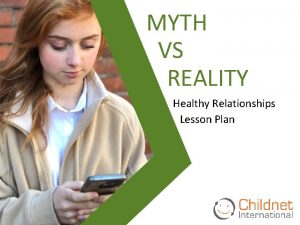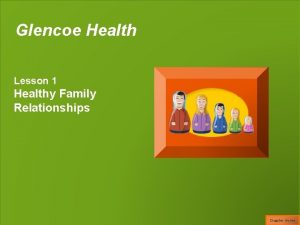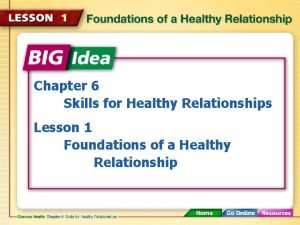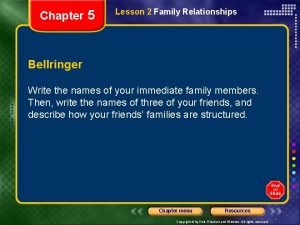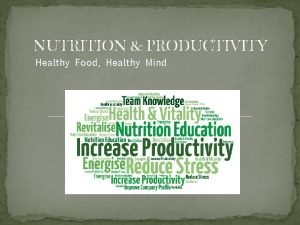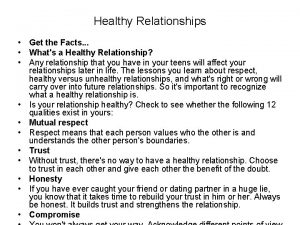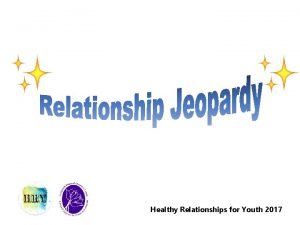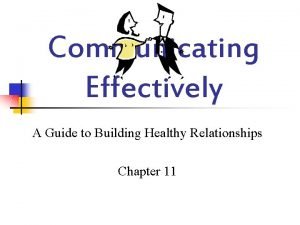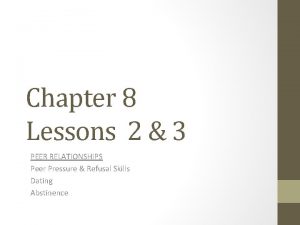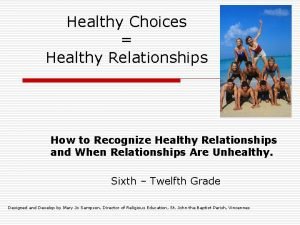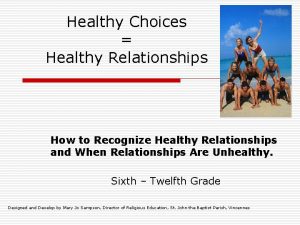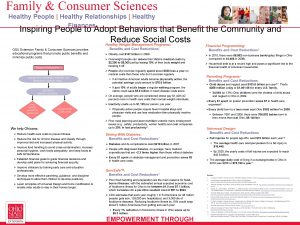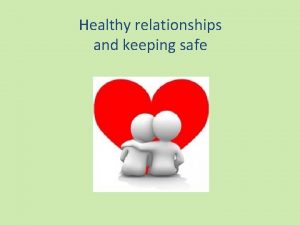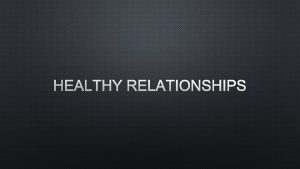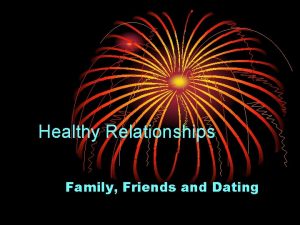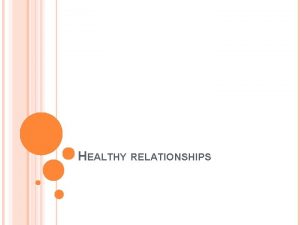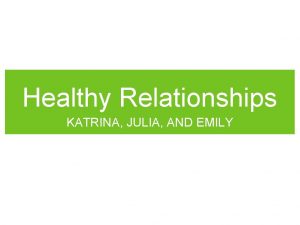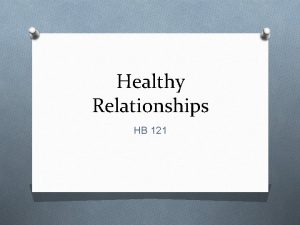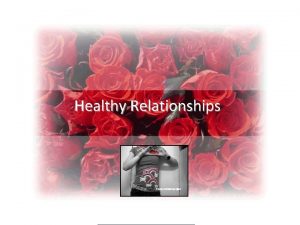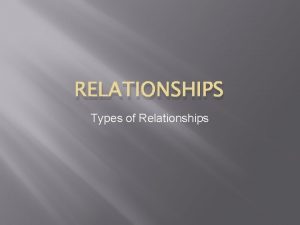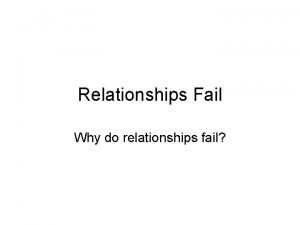Healthy Relationships LESSON 4 Why are healthy relationships


















- Slides: 18

Healthy Relationships LESSON 4

Why are healthy relationships important Each and every one of us are in relationships with other people, so having good relationship is extremely important. Why? Because being in good relationships helps us know ourselves. Having a healthy relationship with yourself and respecting your own body and values can help you have healthy relationships with others. Good relationships also help us develop as a person, grow emotionally, and teach us how to communicate and maintain meaningful bonds with other people. And of course, being in a good relationship is fun! We like to spend time with people who make us feel good, who we can be ourselves with, and who are fun to be around

Healthy Relationships In a good or healthy relationship between two people, each person is allowed to be an individual within the relationship. Both people are allowed to grow independently of each other and as a pair or couple. This kind of healthy relationship involves freedom, encouragement and support of each other’s efforts, boundaries, cooperation and compromise, and being considerate. That all sounds easy, but as we all know, relationships are not easy; they take work, and we need to be conscious of our feelings and those of others. Healthy Relationships Include: • Individual identity and freedom • Encouragement and support • Boundaries • Cooperation and compromise • Consideration of feelings

Unhealthy Relationships There are many types of relationships, and all relationships have good days and bad days. However, the ones you want to avoid are those that make you feel bad about yourself, like you have to do what the other person says, or they make you feel afraid or in danger. A healthy relationship never includes meanspirited teasing or bullying, power struggles, angry outbursts, withholding love, coercion or peer pressure, unreasonable demands, or humiliation. A very unhealthy relationship might include relationship violence. It is a pattern of abuse that happens between people in any type of relationship and may include unwanted sexual advances, sexual contact, or physical, verbal and/or emotional abuse. No one deserves abuse. It does not matter what the person’s appearance, attitude, beliefs, or actions are. There is no excuse for abuse. In addition, being in unhealthy relationships means that things are more likely to “just happen” and become out of control.

Unhealthy Relationships Include: • Hurtful teasing or bullying • Power struggles • Angry outbursts • Withholding love • Coercion or peer pressure • Unreasonable demands • Humiliation

ABCs of Relationships A stands for Awareness • General knowledge and using what you know to respect others and demand respect from others; it’s a two-way street–you have to give it to receive it. • Knowing consequences of unhealthy relationships and danger signs and what your boundaries are. recognizing • Preventing violence by recognizing a lack of power and respect, requiring that you apply the knowledge you have to change unhealthy relationships into healthy ones.

B stands for Balance • Nothing is one-sided. It’s about being in synch with your partner; one person doesn’t have more control or power than the other. • Communication is key to staying balanced; you have to both listen and talk about what each person wants. Both people need to recognized that they each have valuable opinions, and then work together to balance their desires. Both people have valuable feelings and opinions. • Having other friends and interests is another key to remaining balanced. You and your friends probably have similar interests, but you’re not completely the same. The same is true for your family and your boyfriend or girlfriend. You can certainly do things together, but remember that you can have friends and interests too. Make sure you have time for these things. If you change in a relationship and adopt all of the other person’s favourite things, hobbies, lifestyle, etc. , this is a very bad sign.

C stands for Choices • Making a conscious choice, which includes being able to decide what the next step in a relationship is. This is most important in the ABCs. • Making sure things “just happen” simply follows the conscious choice. It is a common excuse teens use for getting into emotional or sexual situations they don’t know how to handle. Things don’t just happen, not unlike car accidents. They are not accidents, someone made a mistake or decision, which led to tragic events.

Keys to a Healthy Relationship Communication involves talking and listening; they go hand-in-hand. And it must be done openly and honestly. Relationships are two-sided; each person has a responsibility to make themselves heard and to hear other people. If you are always listening, or if you are always talking, the relationship is not balanced. When we communicate with another person, what we say is not necessarily the most important part of our message. Our body language and our tone can say so much more than our words.

Keys to a Healthy Relationship Respect is a pattern of behaviour that’s found in healthy relationships. With respect, you have to give it to get it, and everyone deserves respect. People who respect each other: • Trust and support each other • Value each other’s independence • Have the freedom to be themselves • Talk honestly and freely • Make decisions together and compromise • Respect boundaries • Encourage each other to spend time with friends and family

Keys to a Healthy Relationship Trust is an important aspect of any relationship. People in a relationship must be able to trust each other. This means being honest with the other person in the relationship. Having trust in a relationship also means proving to each other that you are reliable and responsible, showing that you are dependable. Relationships without trust lead to: • Second guessing • Not believing each other • Betrayal by sharing secrets with others • Obsessively checking on the other person

Danger Signs Sometimes relationships don’t work out. The “danger signs” of an unhealthy relationship should be easily recognizable: • No communication (lack of talking, inability to listen) and problems • Lack of trust • Jealousy • Lack of balance • Lack of respect avoiding

Red Lights Abuse always escalates, and it rarely gets better. Specifically, if you experience any of these things, you may be involved in an unhealthy relationship. Does the other person… • Put you down? Make you feel that no one else would want you? • Get extremely jealous or possessive? • Constantly check up on you? • Tell you how to dress? • Try to control what you do and who you see? • Have big mood swings–being angry and yelling one minute, and the next minute being sweet and apologetic? • Make you feel nervous or like you’re “walking on eggshells” around them? • Criticize you? Make you feel like you can’t do anything right? • Threaten to hurt you?

Dating Violence Adolescents and adults are often unaware of how regularly dating abuse occurs. Unfortunately, it is quite common. Here are some statistics about dating abuse and how common it is: • One study found that 1 in 4 adolescents report verbal, physical, emotional, or sexual abuse each year (Choose. Respect. org) • Recent studies show that 1/3 of teens experience some form of abuse in dating relationships • More than half of the teens surveyed know of someone who has been abused Because of these kinds of statistics, it is very important to recognize the danger signs of an abusive relationship so that you can make sure you get out as soon as possible.

Dating Violence Cycle Jealousy and possessiveness are two of the most common warning signs of dating abuse. Abusers use them to control the other person’s behaviour. Tension: criticism, yelling, swearing, angry gestures, coercion or threats Violence: physical and sexual attacks or threats Seduction: apologies, promises to change, or gifts These elements can keep the cycle in motion: • Love for the abuser; believing that the relationship is not entirely bad • Hope; thinking things will change or it’s just a phase • Fear; worrying that threats will become a reality, and so, are afraid to end the relationship

Myths of Dating Violence Many people in abusive relationships are in denial. They cling to the myth… 1. That their partner will never do it again. Saying he or she will never do it again is futile because violence is a pattern of behaviours. Rarely does someone abuse their partner only once. 2. That they are not being abused. Dating abuse does include physical and sexual violence. But it also can include emotional and verbal abuse, which includes put-downs, insults, and threats. 3. That they will leave their abuser when the time is right. People stay in abusive relationships for a variety of reasons. These include fear of being alone, emotional dependence, confusion, low selfesteem, not realizing that it’s abuse, or a belief that the abuser will change. 4. That it only happens to girls. Males can also be victims in controlling and abusive relationships. They can be embarrassed to confess that they are being abused because they, the abuser, and other people sometimes have a bias that “only females are abused. ”

Warning Signs What if you suspect that a friend is in an unhealthy relationship? Ask yourself if your friend… • Always worry about making their boy/girlfriend angry? Constantly cancels plans for reasons that don’t sound true? • Give up things that are important? • Shows signs of physical abuse, like bruises or cuts? • Tells you that they get pressured into having sex, or talks about feeling like a sex object? • Have a boy/girlfriend that wants them to be available all the time? • Has become isolated from friends or family?

How to Help them to recognize that feeling badly about themselves is not “normal” and that they deserve a healthy, non-violent relationship. • Encourage their strength and courage. • Do not make them feel badly for their choices, even if you think these choices are wrong. • Offer to go with them to find a counsellor or support group, or to talk to their family, friends, or teachers.
 Insidan region jh
Insidan region jh Hey bye bye
Hey bye bye Healthy vs unhealthy sibling relationships
Healthy vs unhealthy sibling relationships Glencoe health chapter 7
Glencoe health chapter 7 Chapter 7 family relationships
Chapter 7 family relationships Chapter 6 lesson 1 foundations of a healthy relationship
Chapter 6 lesson 1 foundations of a healthy relationship Close family chapter 5
Close family chapter 5 Strong relationships
Strong relationships Dont ask why why why
Dont ask why why why Nutrition and productivity
Nutrition and productivity Healthy soil healthy life poster ideas
Healthy soil healthy life poster ideas Healthy forests healthy communities poster contest
Healthy forests healthy communities poster contest Healthy nurse healthy nation
Healthy nurse healthy nation Relationship jeopardy questions
Relationship jeopardy questions Unhealthy relationship wheel
Unhealthy relationship wheel Facts about healthy and unhealthy relationships
Facts about healthy and unhealthy relationships Relationship jeopardy questions
Relationship jeopardy questions Healthy relationships communicating effectively
Healthy relationships communicating effectively Chapter 8 lesson 1 safe and healthy friendships
Chapter 8 lesson 1 safe and healthy friendships


